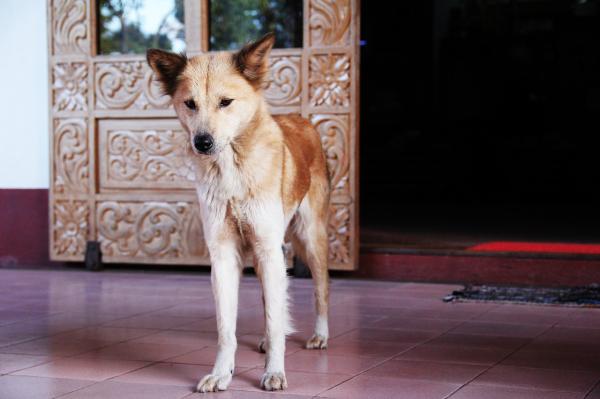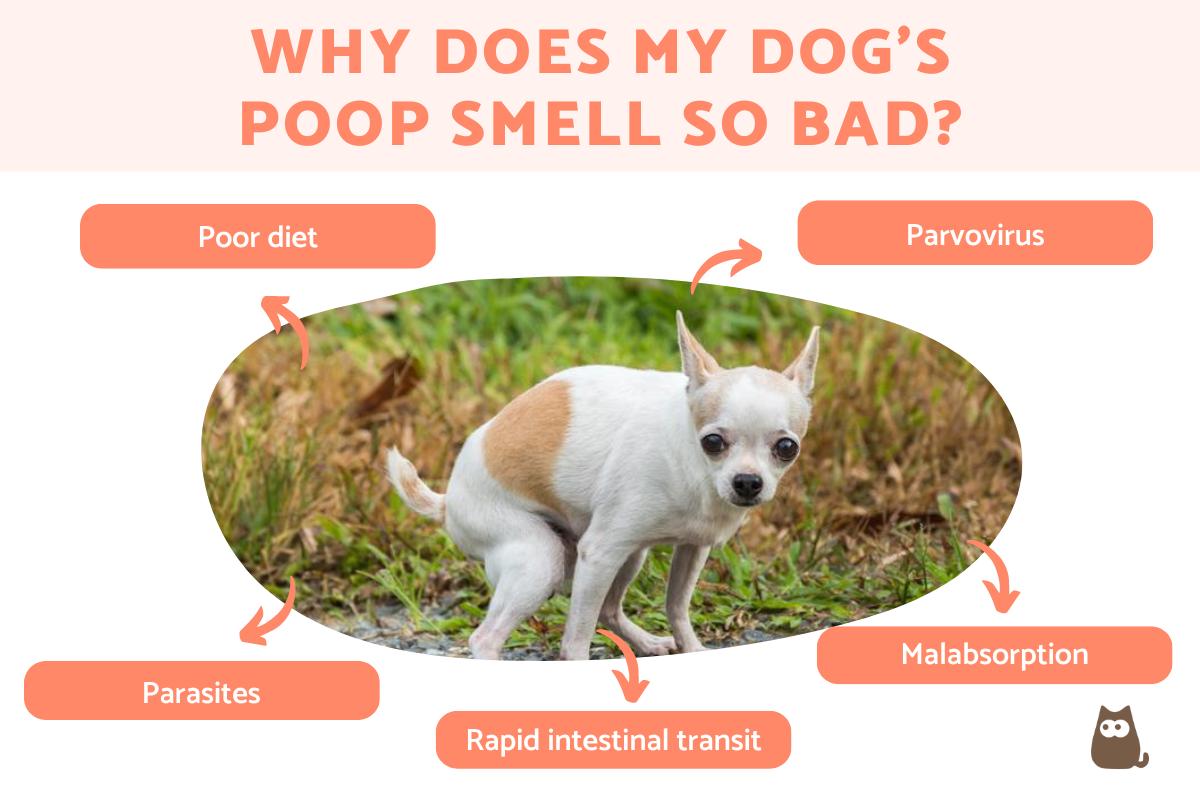Why Does My Dog's Poop Smell So Bad?



See files for Dogs
Stinky dog poop comes with the territory as a dog guardian. A healthy dog will still pass stool that has a far-from-pleasant aroma. However, our dog's stool is a helpful indicator of their overall health. Whether they have diarrhea, blood in their stool or even if they do not poop at their normal rate, it can be a sign there is something wrong with the animal. When the smell is particularly foul, it can imply there is something wrong which needs to be addressed.
Generally speaking, a particularly unusual and foul odor of a dog's poop indicates a digestive problem that could have multiple causes. A good diet, deworming, vaccinations and regular veterinary check-ups help to avoid many of the problems associated with fecal odor. If you have noticed an unusual odor, AnimalWised looks at the causes and treatments of this problem by asking why does my dog's poop smell so bad?
Nutrition problems
Regardless of the type of diet, it is essential that it has the necessary qualities and is adapted to the life stage and characteristics of each dog. By ensuring this, we not only cover their nutritional needs, but we also best guarantee a healthy digestion. In addition to a healthy dog with a shiny coat, the poop will also be of good quality. With an appropriate diet, any stool a dog passes will be small, consistent and have a less unpleasant odor. In this way, we can identify diet as a very common cause of dog poop with a foul odor.
A poor diet will produce bulky stools which will be more frequent and have a softer consistency, often in the form of diarrhea in dogs. For this reason, sometimes the problem is solved with a change in diet or the elimination of any inappropriate foods, e.g. human food. Your veterinarian will be able to solve any doubts you might have about dietary issues, as well as check for nutritional deficiencies.
Apart from the quality of the dog’s food, other dietary issues to take into account include:
- Abrupt changes in diet: can cause digestive transit and alterations to the stool. That is why it is always advisable to make modifications gradually and allow several days for transition in order to avoid digestive problems.
- Food intolerance: allergies or intolerance to meat, fish, eggs, cereals, etc., can also trigger rapid transit. A food that very often affects transit is milk. Dogs that are past the puppy stage lack the enzyme necessary to digest lactose and so, milk can cause digestive disorders. Our article on dog food allergies will reveal more.
- Digestion problems: problems with fermentation processes or other digestive issues can cause poop to have a rancid or foul odor. Ingredients that require more effort for digestion or spend more time in the digestive system can lead to indigestion with fermentation, stomach rumbling, flatulence and foul-smelling poop.
- Gut biome: another possible cause of stinky dog poop is out of control bacterial growth. In these cases, you will need to modify the quality and frequency of feeding. You may also need a veterinarian to prescribe pharmacological treatment.
Remember that foul odors in your dog’s poop, like the smell of spoiled milk, could also be explained by overfeeding. In these cases, your dog will produce a lot of shapeless poop. Adjusting the rations to the manufacturer's recommendations should solve this issue.
Parvovirus
Any change in a puppy’s poop should be reported to a veterinarian, especially as they are more vulnerable during the first few months of life. One specific disease known to cause stools with an unmistakable odor is canine parvovirus, a very contagious and serious viral disease in puppies.
In addition to a foul odor, dog poop will be loose like diarrhea and often contains blood. As an emergency, this must be treated immediately by a veterinarian. There is no specific treatment to combat the parvovirus, but supportive treatments can help the puppy recover. These usually consist of fluid therapy, antibiotics and other drugs to control the clinical signs.
Given the seriousness of the disease, the best thing to do is to prevent it by vaccinating the puppy as indicated by a veterinarian. Other infections may also occur but any diagnosis can only be determined by the vet.
Learn more about these potentially fatal disease with our article on how long a dog can live with parvovirus.

Parasites
Some infestations caused by intestinal parasites, such as hookworms, can also produce bloody diarrhea in dogs with an odor that is different from normal. Giardiasis and coccidia are other pathogens that are associated with more frequent, slimy and foul-smelling stools. We can recognize a possible infestation when we see white worms or eggs in the dog's poop. It is important to know that stinky dog poop does not always accompany a parasitosis.
Parasitosis is more frequent in puppies or weakened adults, but can affect all types of dogs. For these reasons, regular deworming is very important and, if clinical signs appear, the veterinarian should identify the parasite and prescribe specific treatment.
Take a look at this article on the importance of deworming animals to learn more.
Absorption problems
Even though dogs follow a suitable diet, their poop can sometimes be especially foul smelling. They often have a smell similar to sour milk or rotten food which can be related to absorption problems, usually originating in the small intestine or pancreas. In these cases, dogs are thin and malnourished, although they show an increased appetite as if they were always hungry, and their feces, besides smelling bad, are large and greasy, sometimes staining the hair around the anus.
In these cases, the dog is unable to absorb the nutrients contained in the food. Such malabsorption problems in dogs should be diagnosed and treated by a veterinarian. In such cases, intestinal biopsies are usually necessary, as well as fecal analysis. Successful treatment depends on identifying the specific cause.
Rapid intestinal transit
Any disturbance in the digestive system can cause a dog's poop to smell bad. In dogs this situation is not uncommon because they have a tendency to ingest even the smallest seemingly edible substances. This can include garbage from home or the street, any leftover food even if it is moldy, plastics, weeds or even dead animals. Although their stomach is well prepared to digest this type of material, this may cause irritation and lead to rapid transit with foul-smelling diarrhea, since they have not had time to eliminate the water.
This disorder is generally mild, and can be solved with a day of a soft food diet. However, if there is a lot of diarrhea and the dog does not replace the liquids lost, it could become dehydrated. Special attention should be paid to puppies, weaker adults and older dogs. In these cases, you should not wait for it to resolve itself but go to the veterinarian.

Exocrine pancreatic insufficiency
The pancreas plays an important role in digestion so when it stops producing its enzymes, the dog will not be able to absorb all the nutrients it needs. Thus, as in malabsorption syndrome, the dog will be thin, even if it has a voracious appetite and eats more than usual. Poop will be diarrhea-like, large, grayish in color and smell bad. We should also notice the hair around the anus will be greasy. This type of dog stool will help the veterinarian to make this specific diagnosis. Treatment includes providing extra enzymes, to make up for those missing, and dietary management.
For all of the above, if your dog's poop smells really bad and the problem is not a poor quality diet, you should not hesitate to go to the veterinary clinic as soon as possible.

This article is purely informative. AnimalWised does not have the authority to prescribe any veterinary treatment or create a diagnosis. We invite you to take your pet to the veterinarian if they are suffering from any condition or pain.
If you want to read similar articles to Why Does My Dog's Poop Smell So Bad?, we recommend you visit our Intestinal problems category.






 He is 8years old and tonight he has this
He is 8years old and tonight he has this

